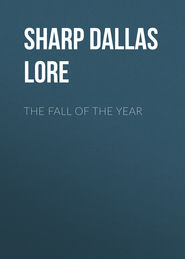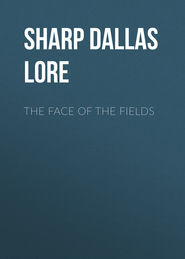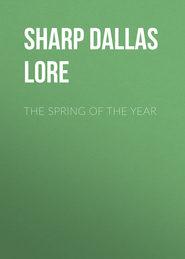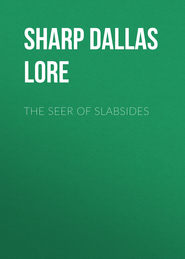По всем вопросам обращайтесь на: info@litportal.ru
(©) 2003-2024.
✖
Winter
Настройки чтения
Размер шрифта
Высота строк
Поля
One of the rarest prints for most snow-hunters nowadays, but one of the commonest hereabouts, is the quick, sharp track of the fox. In the spring particularly, when my fancy young chickens are turned out to pasture, I have spells of fearing that the fox will never be exterminated here in this untillable but beautiful chicken country. In the winter, however, when I see Reynard’s trail across my lawn, when I hear the music of the baying hounds and catch a glimpse of the white-tipped brush swinging serenely in advance of the coming pack, I cannot but admire the capable, cunning rascal, cannot but be glad for him, and marvel at him, so resourceful, so superior to his almost impossible conditions, his almost numberless foes.
We started across the meadow on his trail, but found it leading so straightaway for the ledges, and so continuously blotted out by the passing of the pack, that, striking the wallowy path of a muskrat in the middle of the meadow, we took up the new scent to see what the shuffling, cowering water-rat wanted from across the snow.
A man is known by the company he keeps, by the way he wears his hat, by the manner of his laugh; and among the wild animals nothing tells more of character than their manner of moving. You can read animal character as easily in the snow as you can read act and direction.
The timidity, the indecision, the lack of purpose, the restless, meaningless curiosity of this muskrat were evident from the first in the starting, stopping, returning, going-on track he had plowed out in the thin snow.
He did not know where he was going or what he was going for; he knew only that he insisted upon going back, but all the while kept going on; that he wanted to go to the right or to the left, yet kept moving straight ahead.
We came to a big wallow in the snow, where, in sudden fear, he had had a fit at the thought of something that might not have happened to him had he stayed at home. Every foot of the trail read, “He would if he could; if he couldn’t, how could he?”
We followed him on, across a dozen other trails, for it is not every winter night that the muskrat’s feet get the better of his head, and, willy-nilly, take him abroad. Strange and fatal weakness! He goes and cannot stop.
Along the stone wall of the meadow we tracked him, across the highroad, over our garden, into the orchard, up the woody hill to the yard, back down the hill to the orchard, out into the garden, and back toward the orchard again; and here, on a knoll just at the edge of the scanty, skeleton shadow where the sunlight fell through the trees, we lost him.
Two mighty wings, we saw, had touched the snow lightly here, and the lumbering trail had vanished as into the air.
Close and mysterious the shadowy silent wings hang poised indoors and out. Laughter and tears are companions. Life begins, but death sometimes ends the trail. Yet the sum of life, outdoors and in, is peace, gladness, and fulfillment.
CHAPTER II
THE TURKEY DRIVE
The situation was serious enough for the two boys. It was not a large fortune, but it was their whole fortune, that straggled along the slushy road in the shape of five hundred weary, hungry turkeys, which were looking for a roosting-place.
But there was no place where they could roost, no safe place, as the boys well knew, for on each side of the old road stretched the forest trees, a dangerous, and in the weakened condition of the turkeys, an impossible roost on such a night as was coming.
For the warm south wind had again veered to the north; the slush was beginning to grow crusty, and a fine sifting of snow was slanting through the open trees. Although it was still early afternoon, the gloom of the night had already settled over the forest, and the turkeys, with empty crops, were peevishly searching the bare trees for a roost.
It was a strange, slow procession that they made, here in the New Brunswick forest – the flock of five hundred turkeys, toled forward by a boy of eighteen, kept in line by a well-trained shepherd-dog that raced up and down the straggling column, and urged on in the rear by a boy of nineteen, who was followed, in his turn, by an old horse and farm wagon, creeping along behind.
It was growing more difficult all the time to keep the turkeys moving. But they must not be allowed to stop until darkness should put an end to the march. And they must not be allowed to take to the trees at all. Some of them, indeed, were too weak to roost high; but the flock would never move forward again if exposed in the tall trees on such a night as this promised to be.
The thing to do was to keep them stirring. Once allow them to halt, give one of them time to pick out a roosting-limb for himself, and the march would be over for that afternoon. The boys knew their flock. This was not their first drive. They knew from experience that once a turkey gets it into his small head to roost, he is bound to roost. Nothing will stop him. And in this matter the flock acts as a single bird.
In the last village, back along the road, through which they had passed, this very flock took a notion suddenly to go to roost, and to go to roost on a little chapel as the vesper bells were tolling. The bells were tolling, the worshipers were gathering, when, with a loud gobble, one of the turkeys in the flock sailed into the air and alighted upon the ridge-pole beside the belfry! Instantly the flock broke ranks, ran wildly round the little building, and with a clamor that drowned the vesper bell, came down on the chapel in a feathered congregation that covered every shingle of the roof. Only the humor and quick wit of the kindly old priest prevented the superstitious of his people from going into a panic. The service had to wait until the birds made themselves comfortable for the night – belfry, roof, window-sills, and porch steps thick with roosting turkeys!
The boys had come to have almost a fear of this mania for roosting, for they never knew when it might break out or what strange turn it might take. They knew now, as the snow and the gray dusk began to thicken in the woods, that the flock must not go to roost. Even the dog understood the signs, – the peevish quint, quint, quint, the sudden bolting of some gobbler into the brush, the stretching necks, the lagging steps, – and redoubled his efforts to keep the line from halting.
For two days the flock had been without food. Almost a week’s supply of grain, enough to carry them through to the border, had been loaded into the wagon before starting in upon this wild, deserted road through the Black Creek region; but the heavy, day-long snowstorm had prevented their moving at all for one day, and had made travel so nearly impossible since then that here they were, facing a blizzard, with night upon them, five hundred starving turkeys straggling wearily before them, and a two days’ drive yet to go!
The two brothers had got a short leave from college, and had started their turkey drive in the more settled regions back from the New Brunswick border. They had bought up the turkeys from farm to farm, had herded them in one great flock as they drove them leisurely along, and had moved all the while toward the state line, whence they planned to send them through Maine for the New England market. Upon reaching the railroad, they would rest and feed the birds, and ship them, in a special freight-car ordered in advance, to a Boston commission house, sell the horse and rig for what they could get, and, with their dog, go directly back to college.
More money than they actually possessed had gone into the daring venture. But the drive had been more than successful until the beginning of the Black Creek road. The year before they had gone over the same route, which they had chosen because it was sparsely settled and because the prices were low. This year the farmers were expecting them; the turkeys were plentiful; and the traveling had been good until this early snow had caught them here in the backwoods and held them; and now, with the sudden shift of the wind again to the north, it threatened to delay them farther, past all chance of bringing a single turkey through alive.
But George and Herbert Totman had not worked their way into their junior year at college to sit down by the roadside while there was light to travel by. They were not the kind to let their turkeys go to roost before sundown. It was a slow and solemn procession that moved through the woods, but it moved – toward a goal that they had set for that day’s travel.
All day, at long intervals, as they had pushed along the deep forest road, the muffled rumble of distant trains had come to them through the silence; and now, although neither of them had mentioned it, they were determined to get out somewhere near the tracks before the night and the storm should settle down upon them. Their road, hardly more here than a wide trail, must cross the railroad tracks, as they remembered it, not more than two or three miles ahead.
Leaving more and more of the desolate forest behind them with every step, they plodded doggedly on. But there was so much of the same desolate forest still before them! Yet yonder, and not far away, was the narrow path of the iron track through the interminable waste; something human – the very sight of it enough to warm and cheer them. They would camp to-night where they could see a train go by.
The leaden sky lowered closer upon them. The storm had not yet got under full headway, but the fine icy flakes were flying faster, slanting farther, and the wind was beginning to drone through the trees.
Without a halt, the flock moved on through the thickening storm. But the dog was having all that he could do to keep the stragglers in order; and George, in the rear, saw that they must stir the flock, for the birds were gradually falling back into a thick bunch before him.
Hurrying back to the wagon, he got two loaves of bread, and ran ahead with them to Herbert. The famished turkeys seemed to know what he carried, and broke into a run after him. For half a mile they kept up the gait, as both boys, trotting along the road, dropped pieces of bread on the snow.
Then the whole game had to be repeated; for the greater part of the flock, falling hopelessly behind, soon forgot what they were running after, and began to cry, “Quint! quint! quint!” – the roosting-cry! So, starting again in the rear with the bread, George carried the last of the flock forward for another good run.
“We should win this game,” Herbert panted, “if we only had loaves enough to make a few more touch-downs.”
“There’s half an hour yet to play,” was George’s answer.
“But what on?”
“Oh, on our nerve now,” the older boy replied grimly.
“That railroad is not far ahead,” said Herbert.
“Half an hour ahead. We’ve got to camp by that track to-night or – ”
“Or what?”
But George had turned to help the dog head off some runaways.
Herbert, picking up a lump of frozen leaves and snow, began to break this in front of the flock to tole them on.
He had hardly started the birds again, when a long-legged gobbler brushed past him and went swinging down the road, calling, “Quint! quint! quint!” to the flock behind. The call was taken up and passed along the now extended line, which, breaking immediately into double-quick, went streaming after him.
Herbert got out of the way to let them pass, too astonished for a moment to do more than watch them go. It was the roosting-cry! An old gobbler had given it; but as it was taking him, for once, in the right direction, Herbert ordered back the dog that had dashed forward to head him off, and fell in with George to help on the stragglers in the rear.
As the laggards were brought up to a slight rise in the road, the flock was seen a hundred yards ahead, gathered in a dark mass about a telegraph-pole! It could be nothing else, for through the whirling snow the big cross-arms stood out, dim but unmistakable.
It was this that the gobbler had spied and started for, this sawed and squared piece of timber, that had suggested a barnyard to him, – corn and roost, – as to the boys it meant a human presence in the forest and something like human companionship.
It was after four o’clock now, and the night was hard upon them. The wind was strengthening every minute; the snow was coming finer and swifter. The boys’ worst fears about the storm were beginning to be realized.
But the sight of the railroad track heartened them. The strong-armed poles, with their humming wires, reached out hands of hope to them; and getting among the turkeys, they began to hurry them off the track and down the steep embankment, which fortunately offered them here some slight protection from the wind. But as fast as they pushed the birds off, the one-minded things came back on the track. The whole flock, meanwhile, was scattering up and down the iron rails and settling calmly down upon them for the night.
They were going to roost upon the track! The railroad bank shelved down to the woods on each side, and along its whitened peak lay the two black rails like ridge-poles along the length of a long roof. In the thick half-light of the whirling snow, the turkeys seemed suddenly to find themselves at home: and as close together as they could crowd, with their breasts all to the storm, they arranged themselves in two long lines upon the steel rails.
And nothing could move them! As fast as one was tossed down the bank, up he came. Starting down the lines, the boys pushed and shoved to clear the track; but the lines re-formed behind them quickly, evenly, and almost without a sound. As well try to sweep back the waves of the sea! They worked together to collect a small band of the birds and drive them into the edge of the woods; but every time the band dwindled to a single turkey that dodged between their legs toward its place on the roost. The two boys could have kept two turkeys off the rails, but not five hundred.
“The game is up, George,” said Herbert, as the sickening thought of a passing train swept over him.
The words were hardly uttered when there came the tankle, tankle of the big cow-bell hanging from the collar of the horse, that was just now coming up to the crossing!
George caught his breath and started over to stop the horse, when, above the loud hum of the wires and the sound of the wind in the forest trees, they heard through the storm the muffled whistle of a locomotive.











